诗经英文翻译及讲解
- 格式:ppt
- 大小:487.50 KB
- 文档页数:22
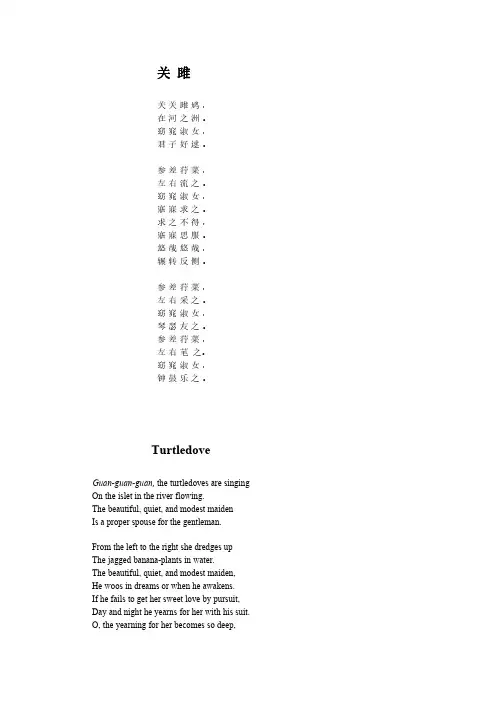
关雎关关雎鸠,在河之洲。
窈窕淑女,君子好逑。
参差荇菜,左右流之。
窈窕淑女,寤寐求之。
求之不得,寤寐思服。
悠哉悠哉,辗转反侧。
参差荇菜,左右采之。
窈窕淑女,琴瑟友之。
参差荇菜,左右芼之。
窈窕淑女,钟鼓乐之。
TurtledoveGuan-guan-guan,the turtledoves are singing On the islet in the river flowing.The beautiful,quiet,and modest maidenIs a proper spouse for the gentleman. From the left to the right she dredges up The jagged banana-plants in water.The beautiful,quiet,and modest maiden, He woos in dreams or when he awakens.If he fails to get her sweet love by pursuit, Day and night he yearns for her with his suit. O,the yearning for her becomes so deep,He tosses from side to side with no sleep.From the left to the right she gently plucksThe jagged banana-plants in water.Playing the stringed instrument and the harp,He makes friends with the quiet,modest maiden.From the left to the right she mildly picksThe jagged banana-plants in water.Playing the sound carillon and the drum,He pleases the quiet and modest maiden.赏析《诗经》是我国古代最早的一部诗歌总集,也是人类历史上最早的诗歌创作的一部分,共有305篇,包括从周初(公元前十一世纪)到春秋中期(公元前七世纪)约500年间的作品,其中大部分是经过整理的古人口头歌谣。
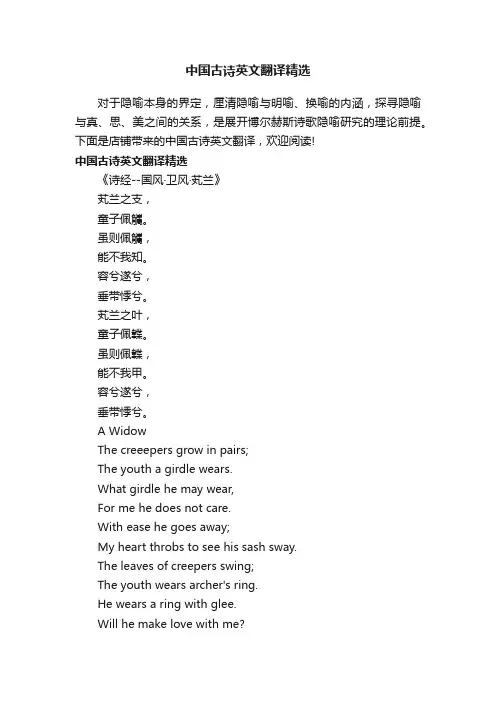
中国古诗英文翻译精选对于隐喻本身的界定,厘清隐喻与明喻、换喻的内涵,探寻隐喻与真、思、美之间的关系,是展开博尔赫斯诗歌隐喻研究的理论前提。
下面是店铺带来的中国古诗英文翻译,欢迎阅读!中国古诗英文翻译精选《诗经--国风·卫风·芄兰》芄兰之支,童子佩觿。
虽则佩觿,能不我知。
容兮遂兮,垂带悸兮。
芄兰之叶,童子佩韘。
虽则佩韘,能不我甲。
容兮遂兮,垂带悸兮。
A WidowThe creeepers grow in pairs;The youth a girdle wears.What girdle he may wear,For me he does not care.With ease he goes away;My heart throbs to see his sash sway.The leaves of creepers swing;The youth wears archer's ring.He wears a ring with glee.Will he make love with me?With ease he goes away;My heart throbs to see his sash sway. 中国古诗英文翻译阅读《诗经--国风·卫风·氓》氓之蚩蚩,抱布贸丝。
匪来贸丝,来即我谋。
送子涉淇,至于顿丘。
匪我愆期,子无良媒。
将子无怒,秋以为期。
乘彼垝垣,以望复关。
不见复关,泣涕涟涟。
既见复关,载笑载言。
尔卜尔筮,体无咎言。
以尔车来,以我贿迁。
桑之未落,其叶沃若。
于嗟鸠兮,无食桑葚!于嗟女兮,无与士耽!士之耽兮,犹可说也;女之耽兮,不可说也。
桑之落矣,其黄而陨。
自我徂尔,三岁食贫。
淇水汤汤,渐车帷裳。
女也不爽,士贰其行。
士也罔极,二三其德!三岁为妇,靡室劳矣。
夙兴夜寐,靡有朝矣!言既遂矣,至于暴矣。
兄弟不知,咥其笑矣。
静言思之,躬自悼矣!及尔偕老,老使我怨。
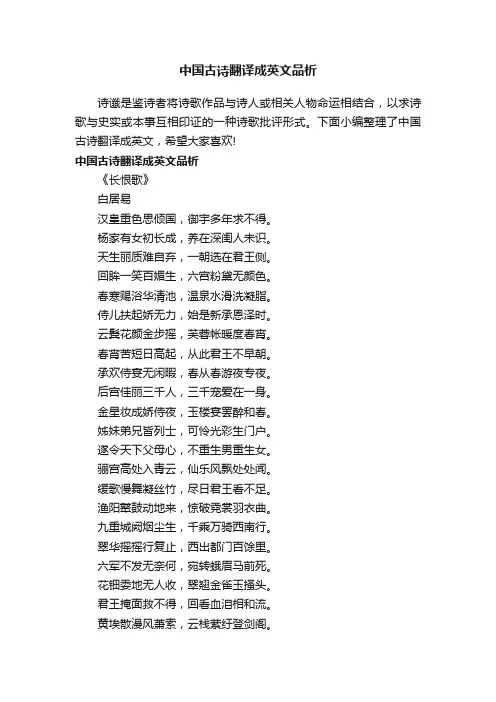
中国古诗翻译成英文品析诗谶是鉴诗者将诗歌作品与诗人或相关人物命运相结合,以求诗歌与史实或本事互相印证的一种诗歌批评形式。
下面小编整理了中国古诗翻译成英文,希望大家喜欢!中国古诗翻译成英文品析《长恨歌》白居易汉皇重色思倾国,御宇多年求不得。
杨家有女初长成,养在深闺人未识。
天生丽质难自弃,一朝选在君王侧。
回眸一笑百媚生,六宫粉黛无颜色。
春寒赐浴华清池,温泉水滑洗凝脂。
侍儿扶起娇无力,始是新承恩泽时。
云鬓花颜金步摇,芙蓉帐暖度春宵。
春宵苦短日高起,从此君王不早朝。
承欢侍宴无闲暇,春从春游夜专夜。
后宫佳丽三千人,三千宠爱在一身。
金星妆成娇侍夜,玉楼宴罢醉和春。
姊妹弟兄皆列士,可怜光彩生门户。
遂令天下父母心,不重生男重生女。
骊宫高处入青云,仙乐风飘处处闻。
缓歌慢舞凝丝竹,尽日君王看不足。
渔阳鼙鼓动地来,惊破霓裳羽衣曲。
九重城阙烟尘生,千乘万骑西南行。
翠华摇摇行复止,西出都门百馀里。
六军不发无奈何,宛转蛾眉马前死。
花钿委地无人收,翠翘金雀玉搔头。
君王掩面救不得,回看血泪相和流。
黄埃散漫风萧索,云栈萦纡登剑阁。
峨嵋山下少人行,旌旗无光日色薄。
蜀江水碧蜀山青,圣主朝朝暮暮情。
行宫见月伤心色,夜雨闻铃肠断声。
天旋地转回龙驭,到此踌躇不能去。
马嵬坡下泥土中,不见玉颜空死处。
君臣相顾尽沾衣,东望都门信马归。
归来池苑皆依旧,太液芙蓉未央柳。
芙蓉如面柳如眉,对此如何不泪垂! 春风桃李花开日,秋雨梧桐叶落时。
西宫南内多秋草,落叶满阶红不扫。
梨园子弟白发新,椒房阿监青娥老。
夕殿萤飞思悄然,孤灯挑尽未成眠。
迟迟钟鼓初长夜,耿耿星河欲曙天。
鸳鸯瓦冷霜华重,翡翠衾寒谁与共? 悠悠生死别经年,魂魄不曾来入梦。
临邛道士鸿都客,能以精诚致魂魄。
为感君王辗转思,遂教方士殷勤觅。
排空驭气奔如电,升天入地求之遍。
上穷碧落下黄泉,两处茫茫皆不见。
忽闻海上有仙山,山在虚无缥缈间。
楼阁玲珑五云起,其中绰约多仙子。
中有一人字太真,雪肤花貌参差是。
金阙西厢叩玉扃,转教小玉报双成。
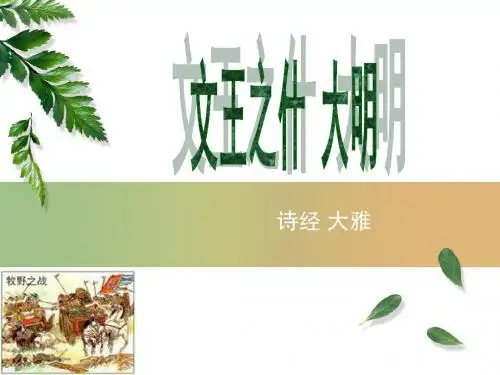
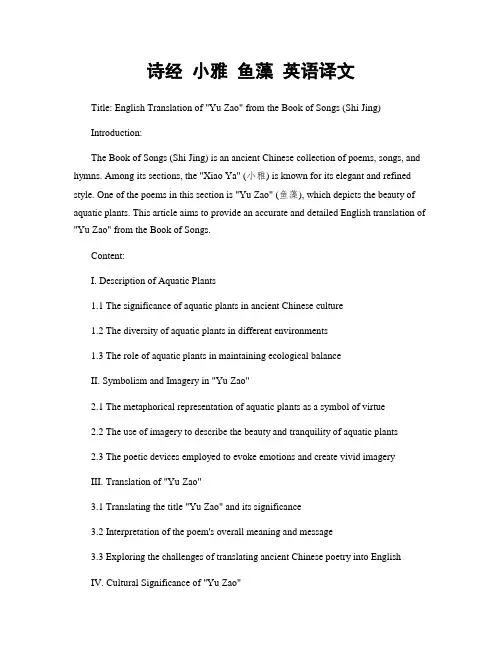
诗经小雅鱼藻英语译文Title: English Translation of "Yu Zao" from the Book of Songs (Shi Jing)Introduction:The Book of Songs (Shi Jing) is an ancient Chinese collection of poems, songs, and hymns. Among its sections, the "Xiao Ya" (小雅) is known for its elegant and refined style. One of the poems in this section is "Yu Zao" (鱼藻), which depicts the beauty of aquatic plants. This article aims to provide an accurate and detailed English translation of "Yu Zao" from the Book of Songs.Content:I. Description of Aquatic Plants1.1 The significance of aquatic plants in ancient Chinese culture1.2 The diversity of aquatic plants in different environments1.3 The role of aquatic plants in maintaining ecological balanceII. Symbolism and Imagery in "Yu Zao"2.1 The metaphorical representation of aquatic plants as a symbol of virtue2.2 The use of imagery to describe the beauty and tranquility of aquatic plants2.3 The poetic devices employed to evoke emotions and create vivid imageryIII. Translation of "Yu Zao"3.1 Translating the title "Yu Zao" and its significance3.2 Interpretation of the poem's overall meaning and message3.3 Exploring the challenges of translating ancient Chinese poetry into EnglishIV. Cultural Significance of "Yu Zao"4.1 The influence of "Yu Zao" on later Chinese literature and art4.2 The role of "Yu Zao" in preserving ancient Chinese customs and traditions4.3 The appreciation of "Yu Zao" as a cultural heritage and its impact on modern societyV. Comparison with Other Translations5.1 Analyzing different English translations of "Yu Zao"5.2 Evaluating the accuracy and effectiveness of various translation approaches5.3 Discussing the challenges and limitations of translating ancient Chinese poetryConclusion:In conclusion, the English translation of "Yu Zao" from the Book of Songs provides a glimpse into the beauty of aquatic plants and the rich cultural heritage of ancient China. Through its symbolism, imagery, and poetic devices, the poem captures the essence of virtue and tranquility. The accurate translation of "Yu Zao" not only preserves the cultural significance of the poem but also allows readers from different cultures to appreciate its timeless beauty.。
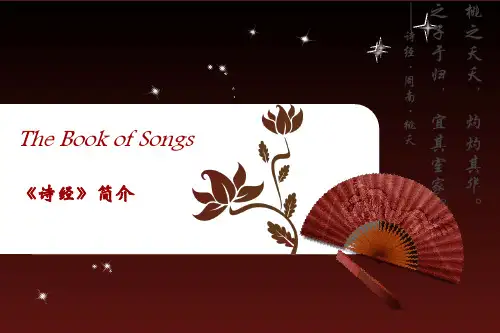
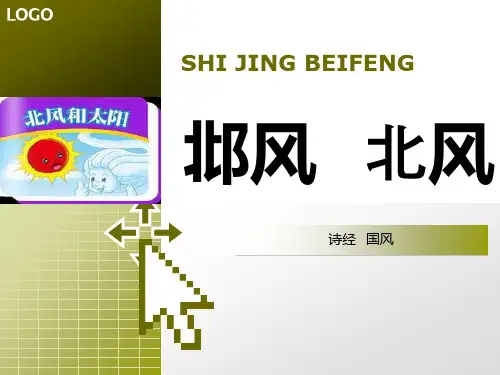
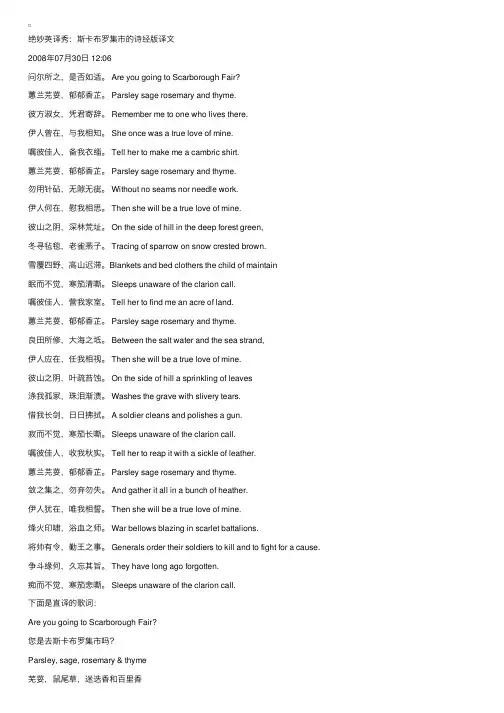
绝妙英译秀:斯卡布罗集市的诗经版译⽂2008年07⽉30⽇ 12:06问尔所之,是否如适。
Are you going to Scarborough Fair?蕙兰芫荽,郁郁⾹芷。
Parsley sage rosemary and thyme.彼⽅淑⼥,凭君寄辞。
Remember me to one who lives there.伊⼈曾在,与我相知。
She once was a true love of mine.嘱彼佳⼈,备我⾐缁。
Tell her to make me a cambric shirt.蕙兰芫荽,郁郁⾹芷。
Parsley sage rosemary and thyme.勿⽤针砧,⽆隙⽆疵。
Without no seams nor needle work.伊⼈何在,慰我相思。
Then she will be a true love of mine.彼⼭之阴,深林荒址。
On the side of hill in the deep forest green,冬寻毡毯,⽼雀燕⼦。
Tracing of sparrow on snow crested brown.雪覆四野,⾼⼭迟滞。
Blankets and bed clothers the child of maintain眠⽽不觉,寒笳清嘶。
Sleeps unaware of the clarion call.嘱彼佳⼈,营我家室。
Tell her to find me an acre of land.蕙兰芫荽,郁郁⾹芷。
Parsley sage rosemary and thyme.良⽥所修,⼤海之坻。
Between the salt water and the sea strand,伊⼈应在,任我相视。
Then she will be a true love of mine.彼⼭之阴,叶疏苔蚀。
On the side of hill a sprinkling of leaves涤我孤冢,珠泪渐渍。
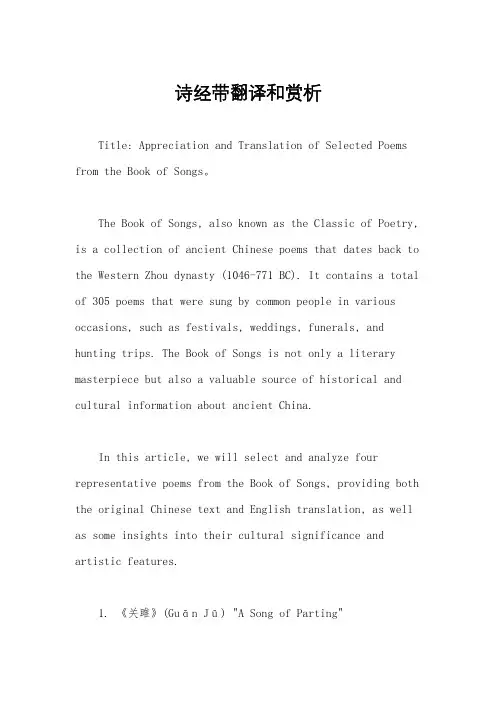
诗经带翻译和赏析Title: Appreciation and Translation of Selected Poems from the Book of Songs。
The Book of Songs, also known as the Classic of Poetry, is a collection of ancient Chinese poems that dates back to the Western Zhou dynasty (1046-771 BC). It contains a total of 305 poems that were sung by common people in various occasions, such as festivals, weddings, funerals, and hunting trips. The Book of Songs is not only a literary masterpiece but also a valuable source of historical and cultural information about ancient China.In this article, we will select and analyze four representative poems from the Book of Songs, providing both the original Chinese text and English translation, as well as some insights into their cultural significance and artistic features.1. 《关雎》(Guān Jū) "A Song of Parting"关关雎鸠,在河之洲。
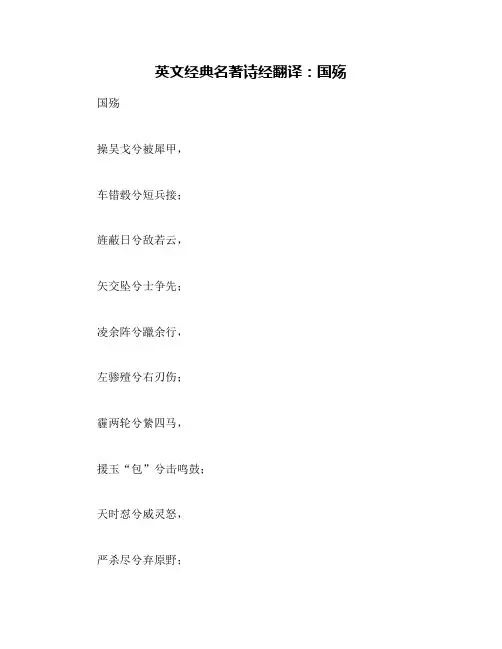
英文经典名著诗经翻译:国殇国殇操吴戈兮被犀甲,车错毂兮短兵接;旌蔽日兮敌若云,矢交坠兮士争先;凌余阵兮躐余行,左骖殪兮右刃伤;霾两轮兮絷四马,援玉“包”兮击鸣鼓;天时怼兮威灵怒,严杀尽兮弃原野;出不入兮往不反,平原忽兮路遥远;带长剑兮挟秦弓,首身离兮心不惩;诚既勇兮又以武,终刚强兮不可凌;身既死兮神以灵,子魂魄兮为鬼雄。
For Thos Fallen For The CountryWe take our sourthern spears and don our coats of mail; When chariot axles clash, with daggers we assail.Banners obscure the sun, the foe roll up like cloud,Arrows fall thick; forward press our warriors proud.Our line is broken through, our position o'errun,My left-hand horse is killed and wounded my right-hand one.The fallen horses block my wheels and I am stayed;In vain I beat the sounding drum with rods of jade.By angry powers' order our men should be slain,And here and there our warriors' corpses strew the plain.They came out not to return to where they belong;The battlefield's so vast, their homeward way so long.With sword in hand and long bow captured from the west,Though head and body sever, their heart's not repressed. They were indeed couragous and ready to fight,And steadfast to the end, undaunted by armed might.Their spirit deathless is, although their blood was shed, Captains among the ghosts, heroes among the dead!。
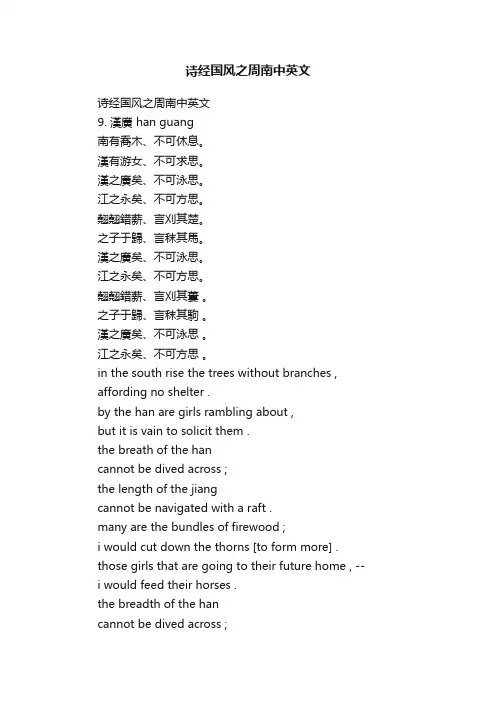
诗经国风之周南中英文诗经国风之周南中英文9. 漢廣 han guang南有喬木、不可休息。
漢有游女、不可求思。
漢之廣矣、不可泳思。
江之永矣、不可方思。
翹翹錯薪、言刈其楚。
之子于歸、言秣其馬。
漢之廣矣、不可泳思。
江之永矣、不可方思。
翹翹錯薪、言刈其蔞。
之子于歸、言秣其駒。
漢之廣矣、不可泳思。
江之永矣、不可方思。
in the south rise the trees without branches , affording no shelter .by the han are girls rambling about ,but it is vain to solicit them .the breath of the hancannot be dived across ;the length of the jiangcannot be navigated with a raft .many are the bundles of firewood ;i would cut down the thorns [to form more] . those girls that are going to their future home , -- i would feed their horses .the breadth of the hancannot be dived across ;the length of the jiang ,cannot be navigated with a raft .many are the bundles of firewood ;i would cut down the southern wood [to form more] . those girls that are going to their future home , --i would feed their colts .the breadth of the hancannot be dived across ;the length of the jiangcannot be navigated with a raft .。
Introduction to The Book of SongsAs the first collection of poems in china, The Book of Songs (or another kind of translation —shī jīng) recorded a total of 305 poems created over a period of 500 years or so, from the early Western Zhou Dynasty (西周) to the middle of the Spring and Autumn Period . It had a history as long as two thousand and five hundred years. Generally believed that agriculture began and developed in the Zhou Dynasty. And in the Book of Songs, a lot of proms are about farming activities.In the other hand, The Book of Songs is closely related to ancient musical activities and dancing. So some take it as the first written music book of ancient China. The more ancient a poem in the Book of Songs is, the closer relation between it and official/ sacrificial(祭祀)music. Later poems of the Book of Songs are folk songs. Unfortunately after 5th century B.C., the original music scores(乐谱)were completely lost.The book later became one of the six classics :(《诗经》《尚书》《仪礼》《乐经》《周易》《春秋》)of the Confucian school(儒学); And also the fountainhead(源头)of Chinese literature.Generally the Book of Songs would be divided into 3 sections: Folk Songs, Odes[əʊdz], and Hymns[him]. And Hymns[him] is divided into Greater Odes & Lesser Odes).Introduction—Folk Songs•Songs NO. 1-160.•Contains 15 groups of songs with folk features, from 15 geographical areas(地理区域).•These folk songs are Rich in content, dealing with labor, love affairs, marriage, hardships of the unprivileged(弱势群体), and protests against tyranny(暴政) and war.Introduction—Odes•In total 105 poems, NO.161-265.•Some poems overlap with the Folk Song in folk attributes, and others composed for banquets and feasts(宴会和节日). •2 kinds: Greater Odes大雅, Lesser Odes小雅.Introduction—Hymns•No. 266-305•It is divided into the Zhou hymns (周颂), Lu hymns (鲁颂), and Shang hymns (商颂), i.e., hymns from differentdynasties (王朝), and the home state of Confucius. •Most of these are formal, ritual hymns that praise the ancestors envisioned (展望), in the rites (仪式).Introduction•Totally the subject matter of the poems varies greatly from one section to another.•While in the presentation of theme the tone may be positive or censuring, the later editor of the book, Confucius (孔子), commented that the poems could be described as “Havingno depraved thoughts(思无邪)”.Style of the Book of Songs•In general, straightforward and natural. •Typical of ancient literature: the immediacy (直接反映) of imagery and persuasive musical quality.•The poems are rich in metaphors (隐喻) and similes (明喻), both direct (兴) and indirect(比), as well as narrative displays (赋).Style of the Book of Songs•The majority of the poems were composed spontaneously(自发地) before specific audiences. •Poems: no title, usually the first two Chinese characters will be used as the title.•Poets: anonymous (匿名的) except three.The Book of Songs: Guan Ju(关雎)•The most famous and well-known poem in Shijing. •The Ode celebrates the virtue of the bride of King Wen of Zhou Dynasty(周文王).•His name in Chinese is literally synonymous with “culture” (文) or “civilization.” H e is remembered for his piety towards the gods and ancestors, and his concern for the well-being of the people.Book of Songs: “Rats”•Strong criticism of the situation at that time. •Being a farmer, one has to work very hard for survival but officials are like big rats eating their production.Influence of the Book of Songs•The Book of Songs occupies an important place in the history of Chinese literature.•The Book of Songs has exerted a profound influence upon the entire course of the development of Chinese poetry.Thank You !。
翻译美学视角下《诗经》英译对比分析《诗经》是我国古代文化和文学的瑰宝,它是中国古代诗歌的开山之作,也是世界上最早的诗歌遗存之一。
它收录了300多首古代诗歌,涵盖了爱情、婚姻、家庭、社会等方方面面。
由于这些诗歌的文化背景和古老的文字风格,翻译《诗经》一度成为了一个艰巨的任务。
在这篇文章中,我们将从美学的角度对《诗经》的英译进行分析与比较。
让我们来看看《诗经》中的一首名为《关雎》的诗歌。
这首诗描述了一个女子的思念之情和对未来的期盼。
以下是几种不同版本的翻译:版本一:关关雎鸠,在河之洲。
窈窕淑女,君子好逑。
参差荇菜,左右流之。
窈窕淑女,寤寐求之。
求之不得,寤寐思服。
悠哉悠哉,辗转反侧。
版本二:有一对鹧鸪,在河边的岛上。
纤巧漂亮的女子,君子们喜欢佳人。
像浮萍一样飘荡,左右随波逐流。
纤巧漂亮的女子,白天夜里都在期盼。
期盼而得不到,白天夜里都在思念。
这思念真深,真令人辗转反侧。
这两个版本中,第一个版本使用了一些古文的词汇和句式,给人一种古老而庄严的感觉。
第二个版本则更加现代化,使用了一些通俗易懂的词汇和句子结构,以便更好地传达原诗的意境。
在美学的角度上,每个版本都有其独特之处,并不能说哪个版本更好,而是要看读者的个人喜好。
版本一:静女其姝,俟我于城隅。
爱而不见,搔首踟蹰。
版本二:平静漂亮的姑娘,等待我在城角。
爱你却见不到你,不知所措,纠结不已。
版本一:秋风萧瑟,洪泽湖水寒冷。
落叶凋零,野草凋零。
念我独行,凄凄切切。
在翻译《诗经》时,美学视角是一个十分重要的要素。
不同的翻译版本有着不同的风格和特点,读者可以根据自己的喜好选择适合自己的版本。
无论是古文中的短语和词汇,还是现代化的词汇和句子结构,都可以有效地传达原诗的意境和情感。
最重要的是,在翻译过程中保持原诗的美感和诗意,使读者能够真正领略和理解《诗经》的魅力。